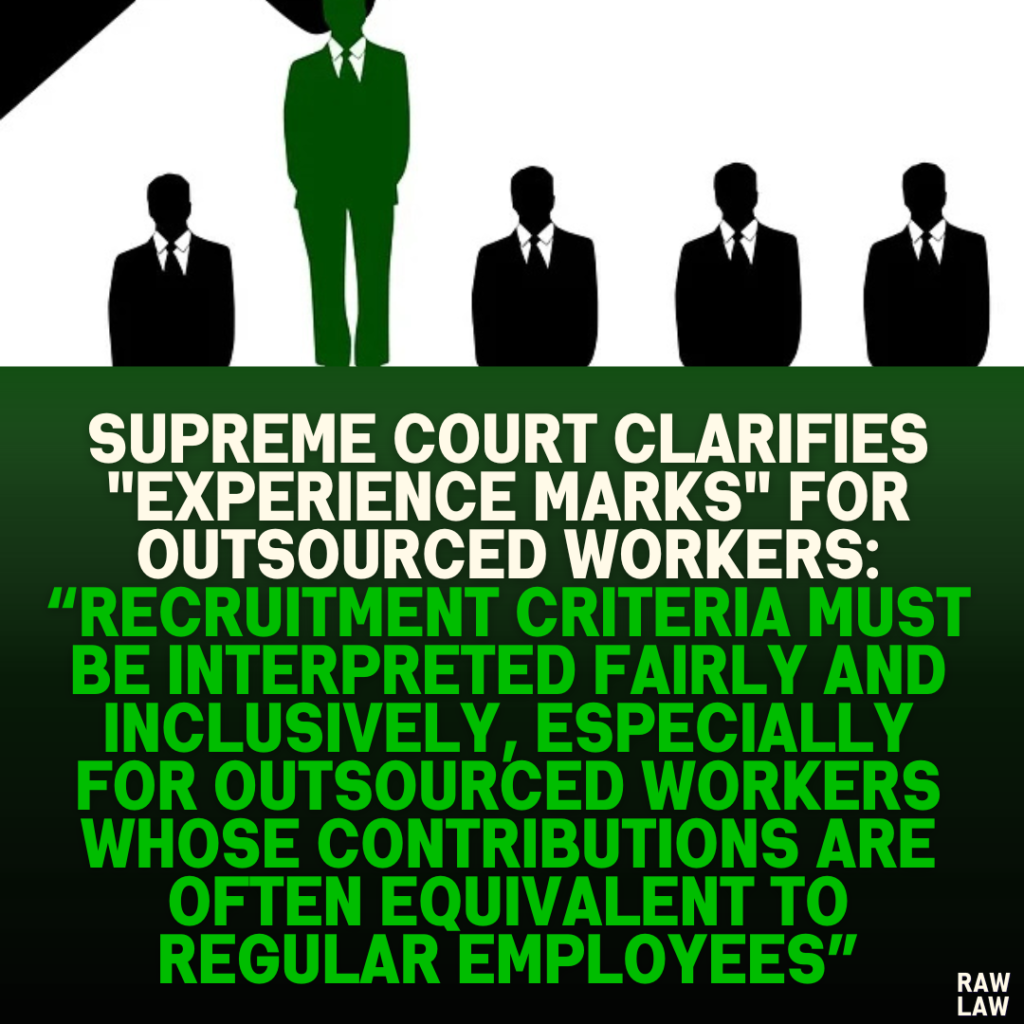Court’s Decision:
The Supreme Court upheld the Punjab and Haryana High Court‘s decision, which granted 0.5 experience marks to an outsourced worker employed as a clerk-cum-typist. The Court ruled that denying marks for technical reasons such as the source of the experience certificate was inconsistent with the principles of equality and social justice.
Facts:
- The respondent worked as an outsourced clerk-cum-typist for Chaudhary Charan Singh Haryana Agricultural University through a third-party service provider.
- The university advertised vacancies for clerical posts and included criteria to award experience marks (0.5 marks for every year or part exceeding six months) for those with relevant work experience.
- Despite meeting the tenure and role requirements, the respondent was denied marks for her experience. The reasons cited were:
- Her experience was on an outsourced basis, not in a regular or sanctioned post.
- The certificate was issued by the service provider, not directly by the university.
- This denial resulted in the respondent falling short in the merit list, prompting her to challenge the decision in court.
Issues:
- Eligibility for Experience Marks: Did the respondent’s work as outsourced manpower qualify for marks under the recruitment advertisement?
- Validity of the Certificate: Could an experience certificate issued by a service provider, countersigned by the department head, be accepted?
Petitioner’s Arguments:
- Nature of Employment: The respondent’s role as an outsourced worker under the university’s Outsourcing Policy was not equivalent to working on a sanctioned post. Marks for experience should be limited to those employed on sanctioned posts.
- Invalid Certificate: The experience certificate was issued by a service provider, not the university. Such a certificate could not be considered valid under the recruitment guidelines.
- Merit-Based Selection: Granting the mark would disturb the merit list and seniority of selected candidates.
- Advertisement Interpretation: The university argued that the advertisement implied experience gained only on sanctioned posts qualified for marks.
Respondent’s Arguments:
- Substance over Form: The respondent argued that the nature of work she performed as an outsourced worker was the same as those in sanctioned posts.
- Constitutional Violation: Denial of experience marks was arbitrary and violated the constitutional principles of equality under Articles 14 and 16.
- Countersigned Certificate: The experience certificate was countersigned by the department head, validating her work in the university, irrespective of the mode of employment.
- Vacancy and Validity of Selection List: The selection list had remaining vacancies, and the respondent’s inclusion would not affect those already appointed.
Analysis of the Law:
- Constitutional Principles: The court emphasized the principles of equality and non-arbitrariness enshrined in Articles 14 and 16. Denying marks for a procedural technicality without assessing the actual work done violates these principles.
- Advertisement’s Language: The court analyzed the recruitment advertisement and found no explicit requirement for experience to be on a sanctioned post. It ruled that “experience” should be assessed based on the nature of work performed.
- Judicial Precedents:
- Dr. Kumar Bar Das v. Utkal University (1999): The Supreme Court emphasized interpreting recruitment rules pragmatically to avoid rigid and technical exclusion.
- Dr. (Major) Meeta Sahai v. State of Bihar (2019): Work experience, irrespective of its modality, should be considered if the role performed matches the advertised post’s requirements.
- Social Justice: The judgment emphasized that recruitment policies must reflect social justice principles, especially for marginalized or outsourced workers performing equivalent tasks.
Precedent Analysis:
The court distinguished the case at hand from previous judgments that limited marks for experience to sanctioned posts. It instead aligned the decision with precedents supporting inclusive and pragmatic interpretation of recruitment rules.
Court’s Reasoning:
- Experience Marks: The court observed that the recruitment advertisement did not explicitly require experience to be on a sanctioned post. Thus, denying marks to the respondent based on this ground was unjustified.
- Validity of the Certificate: The countersigning of the certificate by the department head validated the respondent’s work experience. The court ruled that the procedural aspect of who issued the certificate should not undermine genuine claims.
- Nature of Work: The court held that the work performed by the respondent as a clerk-cum-typist was comparable to that of sanctioned clerical posts. The mode of employment (outsourced or regular) should not matter if the job responsibilities align.
Conclusion:
- The Supreme Court upheld the High Court’s decision to award the respondent 0.5 marks for her work experience.
- It clarified that recruitment criteria must be interpreted fairly and inclusively, especially for outsourced workers whose contributions are often equivalent to regular employees.
- The appeal was dismissed without costs, affirming the respondent’s eligibility for appointment based on revised merit.
Implications:
- Recognition of Outsourced Workers: This judgment sets a precedent for recognizing outsourced employees’ contributions in public employment processes.
- Reforms in Recruitment Policies: It may prompt institutions to revise recruitment advertisements and explicitly define eligibility criteria to avoid ambiguities.
- Social Justice: The judgment reinforces the principle that procedural technicalities should not override the substantive rights of individuals, particularly in cases involving marginalized workers.
- Impact on Similar Cases: This ruling may influence decisions in similar disputes where outsourced workers seek recognition of their experience for public employment.



